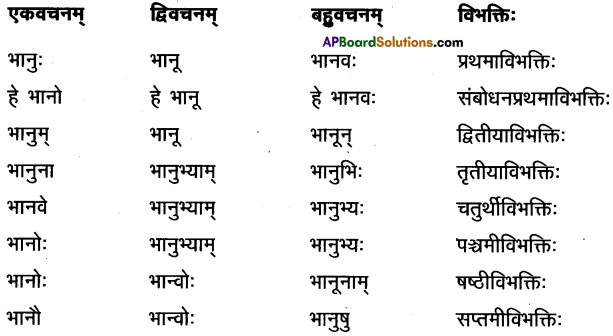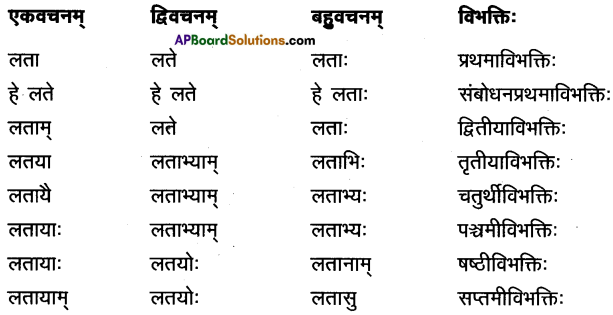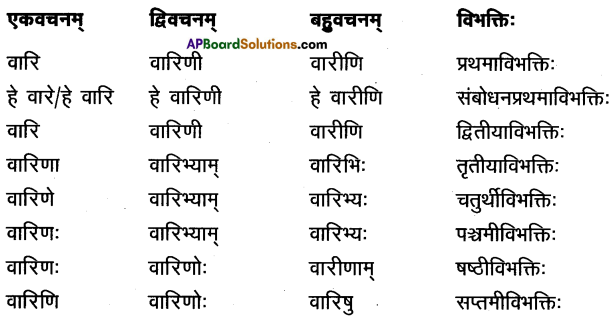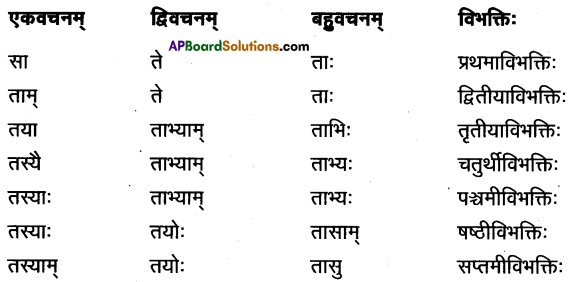Self-assessment with AP Inter 1st Year Sanskrit Model Papers Set 8 allows students to take charge of their own learning.
AP Inter 1st Year Sanskrit Model Paper Set 8 with Solutions
Time : 3 Hours
Max Marks : 100
सूचना : प्रथम, द्वितीय, तृतीयप्रश्नान् अनुवादप्रश्नं च विहाय अन्ये प्रश्नाः संस्कृतभाषायामेव समाधातव्याः ।
1. एकं श्लोकं पूरयित्वा भावं लिखत । (6 × 1 = 6 M)
अ) संपत्सु महतां …………………. संधातकर्कशम् ।।
ज.
संपत्सु महतां चित्तम् भवेदुत्पलकोमलम् ।
आपत्सु च महाशैलशिलासंघातकर्कशम् ।।
The heart of the noble becomes soft like the lotus in prosperity. It is hard like a mountain rock during adversity.
आ) दरिद्राय कृतं दानं ……………….. अश्वमेधसमं विदुः ||
ज.
दरिद्राय कृतं दानं शून्यलिङ्गस्य पूजनम् ।
अनाथप्रेतसंस्कारम् अश्वमेधसमं विदुः ॥
Donation given to a poor man, worship offered to an abandoned Shiva linga and funeral rites performed to a dead orphan are equivalent to the performance of horse sacrifice.
II. एकं निबन्धप्रश्नं समाधत्त । (6 × 1 = 6M)
अ) मायावटोः सम्भाषणकौशलं संक्षेपेण वर्णयत । (6 × 1 = 6 M)
जवाब:
Introduction : The lesson “Mayavatu” is taken from the work Kumarasambhava written by Kalidasa. The fifth canto of the work describes the arrival of Siva in the guise of a celibate to test Parvati.
The false celibate: A celibate, shining with spiritual glow, wearing deerskin and holding a staff of Palasa entered the hermitage of Parvati like the embodiment of Brahmacharya. After receiving the hospitality of Parvati he asked her whether fuel sticks and kusa grass were easily available. He further said that physical body is the primary means of dharma. शरीरमाद्यं खलु धर्मसाधनम् ।
The celibate’s query: Then he asked her the reason for her penance saying that friendship with the good happens in seven steps or words. मनीषिभिः साप्तपदीनमुच्यते | She was born in a noble family, beautiful, wealthy and young. She could not face any humiliation in her parental house. Her father’s abode was divine. She should not search for a husband as a gem does not search, it is searched for. न रत्नमन्विष्यति मृग्यते हि तत् । He offered her half of his penance to get her desired husband.
The reason for Parvati’s penance: The friend of Parvati told the celibate that having rejected Indra and others, Parvati wanted Siva as her husband. He was not to be won over by beauty as he destroyed Manmatha. When Parvati confirmed it, the celibate said that he would not support her as he knew Siva as one indulged in inauspicious practices.
Censure of Siva by the celibate: The celibate said that it would be inappropriate to let ashes take the place of sandal paste on the bosom of Parvati. People would smile seeing her riding a bull. Siva had deformed body. His birth was unknown. His wealth was indicated by his nakedness.
Parvati’s reply: Then Parvati replied angrily that he did not know Siva properly. Stupid people despise the acts of the noble. Though penniless, Siva was the source of riches. He was the lord of the three worlds. No one knew whether his body shone with ornaments or snakes, elephant hide or fine garments, and whether he held a skull or sported the crescent moon on the crest. Indra, who rode an elephant bowed to him. How could anyone know the origin of Siva, who was considered the cause of the creator? She said that her mind was fixed on him with the feeling of love.
When Parvati was about to go from there, Siva revealed himself to her and said that he became her slave. Fruition makes exhaustion fresh again. क्लेशः पुनर्नवतां विधत्ते ।
आ) “अमरवाणीप्रशस्तिः” इत्यस्य पाठ्यभागस्य सारांशं लिखत ।
जवाब:
Introduction: The lesson अमरवाणीप्रशस्तिः is taken from सुरवाणीमणिहारः written by. Sri E. Sathakopacharya. The greatness of Sanskrit, the language of the gods is described in a beautiful way in this lesson.
Salutations to Amaravani: The poet salutes to Sanskrit, which is affectionately fondled by Brahma and other gods, praised by Valmiki, Vyasa and other poets, and decorated by Kalidasa and other poets.
The poet says that the speech of the gods has descended to the earth showing compassion on humans, who cannot roam in the heaven or enjoy with the celestial damsels. धरणिममरवाणि प्राप्य नाकीकरोषि ।
He further says that had not the goddess come down thus, men would have fallen in the well of birth and death. Because they would not have known god.
The greatness of Sanskrit: The poet says that Sanskrit is the mother of all languages. भवसि सकलभाषाजन्मदात्री यत्स्तवम् । Other language s shine by their association with Sanskrit just as moon lotuses bloom because of their association with the moon. This language shines with many meanings in every syllable like the ocean with gems. विराजसे अनल्परन्नाद्याश्रयः सागरो यथा | Even if some people criticize her, it does not diminish her greatness. Bursting meteors do not dry up the ocean.
It the greatness of Sanskrit that even after ages passed, one still remembers Valmiki, Vyasa and Kalidasa.
None equals the goddess of speech: Men may make rockets, travel in space reaching the moon or go to the heaven with human bodies, still they pray for the grace of the mother of speech. She subdues the suffering of birth by teaching brahmavidya, delights with the poems of Kalidasa etc. and leads to the path of prosperity by preaching dharma. There is none equal to her. त्वत्समा कास्ति मान्या । There may be many languages in the world. But they are of no use. A river which quenches the thirst of the traveller in summer is the best.
The poet asks man that what happens to him if the bombs he is making explode. If one wants to follow the panchasheel of Nehru, then one should resort to Sanskrit that develops the spiritual knowledge.
III. एकं निबन्धप्रश्नं समाधत्त । (6 × 1 = 6 M)
अ) भोजमहाराजस्य यशः कीदृशमिति वर्णयत ।
Answer:
Introduction: The lesson з taken from the Bhojaprabandha written by Ballala. The poet lived in the eleventh century AD. He described the generosity of Bhoja in this lesson.
Bhoja meets Govinda : One day, while going to the pleasure garden, king Bhoja met a Brahmin. The Brahmin did not bless the king, and closed his eyes on seeing the king. When the king asked the Brahmin replied that on seeing a non-generous person in the morning, one would incur loss. Kings like Karna, Sibi and others lived even after death because of their charitable nature. One should earn fame in the perishable bodies. तस्मात् देहेष्वनित्येषु कीर्तिमेकामुपार्जयेत् ।
The king donated one lakh to that Govinda, and asked him to bring poets and scholars to the court. He became famous as a generous king. He removed his minister who told him kings became victorious by the strength of their treasury. He ordered that money and villages be granted to poets and scholars.
The Kalinga Poet : Once a poet from Kalinga came. He said that on seeing Bhoja, the enemies would drop their weapons, poets their suffering and women their saree-knot. The king gave him one lakh. The king donated five lakhs to a tribesman for his singing. The poet expressed his indignation in a verse referring to a lotus whose merits did not shine. यल्लक्ष्मीवसतेस्तव मधुपैरुपभुज्यते कोश: । The king donated him another lakh saying that the kings honoured talent only, and not lineage.
Other poets: Then five or six poets arrived there. The Kalinga poet said that it was the fault of the fragrance of the lotus that bees haunted its every petal. The king was pleased and gave another lakh to him. Later one of the poets said tha’ it w、s a great lake where the filled and the unfilled pots did not collide. The king gave him one lakh. Another poet said that the lake would satisfy the thirst of every one if only there was no crocodile inside.
The king gave two lakhs to him. When Govinda expressed his dissatisfaction, the king removed him from his post. He appointed one of those poets in his place. The king told his minister that if uneducated, even a Brahmin should be sent out of the city, and if educated, even a potter should stay in the city. कुम्भकारोऽपियो विद्वान्संतिष्ठतुपुरेमम । In no time his court was filled with five hundred great poets including Vararuchi, Bana, Mayura etc.
Poet Sankara: One day a poet came to the court and read a verse in praise of the king. He said that whenever the fame of Bhoja increased as if to colour the three worlds white, he was afraid about the black hair of his wife. The king gave twelve lakhs to that poet Sankara.
आ) वर्षापरिदेवनम् इत्यस्य सारांशं लिखत ।
Answer:
Introduction: The lesson Varshaparidevanam was written by Prlf. G.S.R. Krishna Murthy. He wrote Vanaki, Suvarna svachalitam etc. story books. In Varshaparidevanam, the author describes how the goddess of rain laments at the envi- ronmental pollution.
The Early morning :
Once the early mornings were filled with the cooing of the cuckoos, chirping of the birds, fragrant breezes etc. Every where there was purity. All were pure in
body, mind and speech. But time changed. Roads became dusty. Vehicle and factory were emitting smoke. Garbage piled up. Culverts were clogged. People suffered from epidemics. Even the animals and the trees suffered. The goddess of rain was thinking about that. She requested the sun and saw that clouds were formed, and there was rain. She swept the universal yard, and decorated it with the rainbow.
The duties of the season brothers :
The brothers of the rain – goddess helped her. Under the supervision of the Autumn, the rivers became lucid. The Winter drenched the worlds with dew. When Spring came, flowers blossomed. Summer made the twilight hours charming. When the Rain returned, the surroundings were clean, and she felt happy.
The fault of the people :
But things changed, their efforts became futile. The goddess realized that it was not their fault, but that of the people. People did not care about the purity of the environment. Hence there was no use even if there were many sanitary workers. The governments were making some efforts by advertising about cleanliness through print and audio visual media. But no one heard them or followed them. The rain goddess recounted the story of the four workers, All, Someone, Anyone and No one. If everyone acted without instructing others, any work would be successful.
Finally she said that a person who would act alone was a learned one.
IV. चतुर्णां प्रश्नानां समाधानानि लिखत | (4 × 2 = 8 M)
अ) चाणक्यः कस्य राज्ञः अमात्य ?
जवाब:
चाणक्यः चन्द्रगुप्तस्य राज्ञः अमात्यः । सः नन्दवंशम् उन्मूल्य चन्द्रगुप्तं सिंहासने अध्यारोपयत् ।
आ) राटसान्नवाच्याः के भवन्ति ?
जवाब:
अतिकषायपदार्थः, अतिलवणम्, अत्युष्णापदार्थः अतिक्षारपदार्थः, अत्याम्लपदार्थः, अतिक्षातिदाहपदठार्थाः राजसान्नवाच्या भवन्ति ।
इ)
बोपदेवविरचितः व्याकरणशास्त्रग्न्थः कः ?
जवाब:
बोपदेवविरचितः व्याकरणशास्त्रग्रन्थः मुग्धबोधः ।
ई) कुपणस्य अग्रे गमनं दृष्ट्वा सर्वे किं कृतवन्तः ?
जवाब:
कृपणस्य अग्रे गमनं दृष्ट्वा सर्वे अट्टहासं कृतवन्तः ।
उ) नागार्जुकः कः ?
जवाब:
नागार्जुनः रसायनशास्त्रज्ञः प्रसिद्धः चिकित्सकः च ।
ऊ) युवकः वणिजः गृहे केन रूपेण उद्योगं प्राप्तवान् ?
जवाब:
युवक: वणिजः गृहे भृत्यरूपेण उद्योगं प्राप्तवान् ।
V. द्वयोः संदर्भ व्याख्यानं लिखत | (2 × 3 = 6M)
अ) द्विपोऽयमिति मत्वाऽयं बाणेनाभिहतो मया ।
जवाब:
परिचयः – एतत् वाक्यं दशरथस्य पश्चात्तापः इति पाठ्यभागात् स्वीकृतम् । अयं पाठ्यभागः वाल्मीकिरामायणे अयोध्याकाण्डतः स्वीकृतः ।
सन्दर्भः – दशरथः तापसस्य वृद्धं पितरम् एवम् उक्तवान् ।
भाव – अहं गजः इति मत्वा भवतः सुतं बाणेन हतवान् ।
विवरणम् – दशरथः तापसस्य वृद्धं पितरम् उक्तवान् यत् सः कुम्भपूरणशब्दं श्रुत्वा अज्ञानतः गजः इति मत्वा तापसं बाणेन हतवान् इति ।
आ) शरीरमाद्यं खलु धर्मसाधनम् ।
जवाब:
परिचयः – एतत् वाक्यं मायावटुः इति पाठ्यभागात् स्वीकृतम् । एषः भागः कालिदासस्य कुमारसम्भवे पञ्चमसर्गात् स्वीकृतः ।
सन्दर्भः – मायावटुः पार्वतीम् एवं वदति ।
भावः – शरीरम् प्रथमं धर्मसाधनम् भवति ।
विवरणम् : – तपोवनं एकः जटिलः प्रविवेश । सः अपृच्छत् यत् पार्वती स्वशक्त्या तपसि प्रवर्तते । किं च शरीरम् प्रथमं धर्मसाधनम् । इति ।
इ) विराजसेऽनल्परत्नाद्याश्रयः सागरो यथा ।
जवाब:
परिचयः – एतत् वाक्यं अमरवाणीप्रशस्तिः इति पाठ्यभागात् स्वीकृतम् । अस्य कविः श्रीमान् ई. शठकोपाचार्यः ।
सन्दर्भः – कविः अमरवाणीं प्रशंसन् एवं वदति ।
भावः – यथा समुद्रः अनेकरत्नानां आश्रयः भवति तथा अमरवाणी अपि ।
विवरणम् – प्रत्यक्षरं अनेकार्थैः समन्विता अमरवाणी रनैः समुद्रः इव विराजते ।
ई) प्रायेण शक्ता न वयं भवेम ।
जवाब:
परिचयः – एतत् वाक्यं कपीनामुपवासः इति पाठ्यभागात् स्वीकृतम् । अस्य कविः श्रीशैलं ताताचार्यः ।
सन्दर्भः – सर्वे कपयः एवं वृक्षं प्रति गन्तुं निश्चितवन्तः ।
भावः – गन्तुं समर्थाः न भवेम ।
विवरणम् – व्रतोपवासेन पीडिताङ्गाः वयं प्रातः वृक्षं प्रति गन्तुं न समर्थाः भवेम इति कपयः चिन्तितवन्तः ।
VI. द्वयो: संदर्भ व्याख्यानं लिखत | (2 × 3 = 6M)
अ) धैर्यधना हि साधवः ।
जवाब:
परिचयः – एतत् वाक्यम् ‘कपिञ्जलोपदशः इति पाठ्यभागात् स्वीकृतम् । अस्य मूलग्रन्थः कादम्बरी | अस्य कविः बाणः ।
सन्दर्भः – महाश्वेतायाम् अनुरक्तम् पुण्डरीकम् सन्मार्गे प्रवर्तयितुं कपिञ्जलः एवम् उपदिशति ।
अर्थः- साधुजनानां तु धैर्यम् एव धनम् ।
विवरणम् – कपिञ्जलः पुण्डरीकं वदति यत् पुण्डरीकस्य स्थितिः तस्य अनुरूपा न । साधुजनानां धैर्यमेव धनम् । परन्तु पुण्डरीकः विक्लीभवति स्म ।
आ) ईश्वरे च दरिद्रे च मृत्योः सर्वत्र तुल्यता ।
जवाब:
परिचयः – एतत् वाक्यं भोजस्य औदार्यम् इति पाठ्यभागात् स्वीकृतम् । अस्य कविः बल्लालः ।
सन्दर्भः – गोविन्दः भोजम् एवम् अवदत् ।
भावः – मृत्युः धनिकदरिद्रभेदं न गणयति ।
विवरणम् – गोविन्दः भोजम् अवदत् यत् पण्डिते, मूर्खे, बलवति, अबले, धनिके, दरिद्रे च मृत्युः समानः एव ।
इ) न हि परिश्रमात् ऋते पवित्रम् इह किमपि विद्यते ।
जवाब:
परिचयः – एतत् वाक्यं स्वेदस्य पुष्पाणि इति पाठ्यभागात् स्वीकृतम् । अस्य रचयित्री डा. माधवी जोषी ।
सन्दर्भः – मातङ्गः छात्रान् एवम् उपदिष्टवान् ।
भावः – परिश्रमं विना अन्यत् पवित्रम् नास्ति ।
विवरणम् – श्रमजातः स्वेदः पवित्रः इति मातङ्गः उपदिष्टवान् । परिश्रमः एव पवित्रः । श्रमस्य स्वेदः न भवति चेत् जगत् न प्रचलति । इति उक्तवान् ।
ई) जीर्णम् अङ्गे सुभाषितम् ।
जवाब:
परिचयः – एतत् वाक्यम् वर्षापरिदेवनम्इति पाठ्यभागात् स्वीकृतम् । अस्य रचयिता आचार्य गुल्लपल्लि श्रीरामकृष्णमूर्तिः ।
सन्दर्भः – स्वच्छतापरिरक्षणार्थं चिन्तयन्ती वर्षादेवी एतत् वदति ।
भावः – सुभाषितम् मनसि एव स्थापितम् ।
विवरणम् – वर्षादेवी स्वच्छतापरिरक्षणार्थं जनान् बोधयितुम् इष्टवती । परन्तु कः श्रृणोति माम् इति सुभाषितम् अङ्गे जीर्णम् ।
VII. त्रयाणां प्रश्नानां समाधानानि लिखत । (3 × 2 = 6M)
अ) प्रस्तुतपाठ्यांशः कस्मात् उद्धृतः ?
जवाब:
प्रस्तुतपाठ्यांशः वाल्मीकिरामायणे अयेध्याकाण्डात् स्वीकृतः ।
आ) पार्वत्याः तपोवनं कीदृशः वटुः विवेश ?
जवाब:
अजिनाषाढधरः प्रगल्भवाक् ब्रह्ममयेन तेजसा ज्वलन् शरीरबद्धः प्रथमाश्रमः यथा कश्चित् वटुः पार्वत्याः तपोवनं विवेश ।
इ) सन्मित्रलक्षणं किमिति सन्तः प्रवदन्ति ?
जः
पापात् निवारयति, हिताय योजयते, गुह्यं निगूहति, गुणान् प्रकटी करोति, आपद्गतं न जहाति, काले ददाति इति सन्मित्रलक्षणं सन्तः प्रवदन्ति ।
ई) चञ्चलाः मकराः कति ? ते च के ?
जवाब:
चञ्चलाः मकाराः दश । ते – मनः, मधुकरः, मेघः, मानिनी, मदन, मरुत्, मा, मदः, मर्कटः तथा मत्स्यः ।
उ) कविभिः कीदृशी अलङ्कारशोभा आनीता ?
जवाब:
कालिदासादिकविभिः अनुपमा अलङ्कारशोभा आनीता ।
ऊ) कपीनां लौल्यं कथं जातम् ?
जवाब:
कालिदासादिकविभिः अनुपमा अलङ्कारशोभा आनीता ।
VIII. त्रयाणां प्रश्नानां समाधानानि लिखत । (3 × 2 = 6M)
अ) पुण्डरीकः किमर्थं विचारग्रस्थः बभुवः ?
जवाब:
पुण्डरीकः महाश्वेतायाम् अनुरक्तः अभवत् । तपोजपादिनियमेषु अनासक्तः अभवत् । ताम् एव चिन्तयन् विचारग्रस्तः बभूव ।
आ) पुलिन्दपुत्रगानं श्रुत्वा भोजः कियत् धनं दन्दवान् ?
जवाब:
पुलिन्दपुत्रगानं श्रुत्वा भोजः तस्मै पञ्चलक्षं दत्तवान् ।
इ) पञ्चतन्त्रे कति भागाः सन्ति, ते के?
जवाब:
पञ्चतन्त्रे पञ्च तन्त्राणि सन्ति । मित्रभेदः, मित्रसंप्राप्तिः, काकोलुकीयम्, लब्धप्रणाशः तथा अपरीक्षितकारकम् इति ।
ई) शिक्षकः छात्रान् किं प्रश्नं पृष्टवान् ?
जवाब:
अस्मिन् जगति किं जलम् अतीव उत्तमम् ? अतीव पूतं जलं किम् ? किंच जलं मूल्यवत् ? इति शिक्षकः छात्रान् प्रश्नं पृष्टवान् ।
उ) पत्रगतसन्देशः कः ?
जवाब:
यावत् पर्यन्तं गृहे भवन्तः अतिथिसत्कारं करिष्यन्ति तावत् पर्यन्तं भोजनार्थं मम श्रमः न भविष्यति । अहं दैवकार्यार्थं गमिष्यामि । मां मा अन्विष्यन्तु ।
ऊ) चत्वारः पुरुषाः के ?
जवाब:
सर्वः, कश्चित्, यः कोऽपि न कोऽपि इति चत्वारः पुरुषाः ।
IX. ज्वरार्तस्य विरामग्रहणाय अभ्यर्थनपत्रं लिखत ? (1 × 5 = 5M)
जवाब:
राजमहेन्द्रवरम्
दिनाङ्कः 03-12-2018
सविधे –
प्रधानाध्यापकः / प्रांशुपालः
प्रभुत्व (जूनियर्) उच्चमाध्यमिक कलाशाला,
राजमहेन्द्रवरम् ।
मान्याः !
विषयः – विरामस्य कृते अभ्यर्थनम् ।
अहम् अस्मिन् कलाशालायां प्रथमसंवत्सरं पठामि । मम स्वास्थ्यं सम्यक् नास्ति । अहं ज्वरेण पीडितो भवामि | अतः विश्रान्तिं स्वीकर्तुं मह्यं दिनत्रयं 10-22-2018 तः 12-12-2018 पर्यन्तं विरामं यच्छन्तु इति सादरप्रणामपूर्वकं विज्ञापयामि । मम अनुपस्थितिसमये पाठ्यमानान् पाठान् मित्रसकाशात् ज्ञात्वा अहं पठिष्यामि ।
सधन्यवादम् ।
भवतां विधेयः छात्रः
नाम : …………….
अनुक्रमसंख्या ……………
प्रभुत्व (जूनियर्) उच्चमाध्यमिक कलाशाला,
राजमहेन्द्रवरम् ।
(अथवा)
विरामगृहणाय अभ्यर्थनपत्रं लिखत ?
जवाब:
गुन्टूर्
दिनाङ्कः 20-11-2018
सविधे –
प्रधानाध्यापकः / प्रांशुपालः
प्रभुत्व (जूनियर्) उच्चमाध्यमिक कलाशाला,
गुन्टूर्
मान्याः !
विषयः – विरामस्य कृते अभ्यर्थनम् ।
मम सोदर्याः विवाहार्थम् अहं श्वः स्वग्रामं गमिष्यामि । अतः कृपया दिनत्रयस्य 21-11-2018 तः 23-11-2018 पर्यन्तं विरामं यच्छन्तु इति सादरप्रणामपूर्वकं विज्ञापयामि । मम अनुपस्थितिसमये पाठ्यमानान् पाठान् मित्रसकाशात् ज्ञात्वा अहं पठिष्यामि ।
सधन्यवादम् ।
भवतां विधेयः छात्रः
नामः × × × × × × ×
अनुक्रमसंख्या × × × × × × ×
प्रभुत्व जूनियर् कलाशाला,
गुन्टूर् ।
X. द्वयोः शब्दयोः सविभक्तिकरूपाणि लिखत | (2 × 6 = 12 M)
अ) भानु
जवाब:

आ) लता
जवाब:

इ) वारि
जवाब:

ई) तद् (सत्री)
जवाब:

XI. द्वयोः धातुरूपाणि लिखत । (2 × 3 = 6 M)
अ) भविष्यति
जवाब:

आ) धावतु
जवाब:

इ) वदेत्
जवाब:

ई) जायते
जवाब:

XII. त्रीणि सन्धिनामनिर्देशपूर्वकं विघटयत । (5 × 1 = 5M)
अ) वधूहः
जवाब:
वधू + ऊहः = सवर्णदीर्घ सन्धिः
आ) ब्रह्मर्षिः
जवाब:
ब्रह्मा + ऋषिः = गुण सन्धिः
इ) गङ्गौघः
जवाब:
गङ्गा + ओघः = वृद्धि सन्धिः
ई) मात्राज्ञा
जवाब:
मातृ + आज्ञा = यणादेश सन्धिः
उ) भानवे
जवाब:
भानो + ए = अयावायाव सन्धिः
ऊ) प्रथमोऽध्यायः
जवाब:
प्रथमः + अध्यायः = विसर्ग सन्धि:
XIII. त्रीणि सन्धिनामनिर्देशपूर्वकं सन्धत्त । (5 × 1 = 5M)
अ) राम + आलयः
जवाब:
रामालयः = सवर्णदीर्घ सन्धिः
आ) रमा + ईशः
जवाब:
रमेशः = गुणं सन्धिः
इ) एक + एक:
जवाब:
एकैकः = वृद्धि सन्धिः
ई) लृ + आकृति:
जवाब:
लाकृतिः = यणादेश सन्धिः
उ) भानो + ए
जवाब:
भानवे = अयवायाव सन्धिः
ऊ) वृझे + अपि
जवाब:
वुक्षेऽपि = विसर्ग सन्धिः
XIV. आन्ध्रभाषायां वा आङ्ग्लभाषायां वा अनुवदत । (5 × 1 = 5M)
अ) शिवः फलं खादति ।
जवाब:
Siva eats fruit.
आ) सा क्षीरम् अपिबत् ।
जवाब:
She drank milk.
इ) कः समाधानं लेखिष्यति ।
जवाब:
Who will write the answer.
ई) ते पाठं पाठयन्ति ।
जवाब:
They will read the lesson.
उ) स्वदेशे पूज्यते राजा विद्वान् सर्वत्र पूज्यते ।
जवाब:
A King is honoured in his own country.
XV. एकेन पदेन समाधत्त । (5 × 1 = 5M)
अ) घटमादाय दशरथः कुत्र जगाम ?
जवाब:
आश्रमं ।
आ) पार्वत्याः तपोवनं कः प्रविवेश ?
जवाब:
जटिलः ।
इ) महतां चित्तं सम्पत्सु कयं भवेत् ?
जवाब:
ऊपलकोमलं ।
ई) श्रेष्ठं धनं किम् ?
जवाब:
विद्याधनं ।
उ) विबुधवाणी कैः भवतापं शमयति ?
जवाब:
ब्रह्मविद्या प्रबोधैः ।
XVI. एकेन पदेन समाधत्त । (5 × 1 = 5M)
अ) धैर्यधनाः के ?
जवाब:
साधवाः ।
आ) भोजः शङ्करकवेः कियत् ददौ ?
जवाब:
द्वादरालक्षौ ।
इ) क्षणभङ्गुराः के ?
जवाब:
प्राणाः ।
ई) स्वेदबिन्दवः कुत्र पतन्ति स्म ?
जवाब:
भूमौ ।
उ) वायुः कान् चालयति ?
जवाब:
मेधान् ।